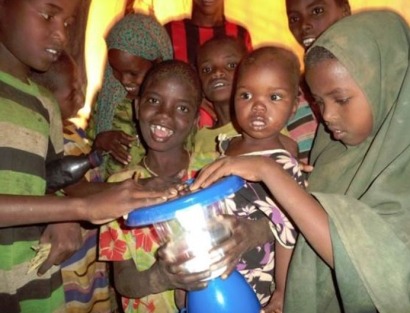
The challenge is open to individuals and businesses from all sectors and is judged by a panel of experts from NGOs, industry and the humanitarian and development aid sector, led by Michael Pritchard MBE.
Last year’s prize was scooped by India-based Sunlite Solar, for their solar-powered lantern which provides 9 to10 hours of light and charges a mobile phone to have approximately 40 minutes of talk-time.
Since then 100,000 of these lanterns have been distributed in UN refugee camps around the world, including 50,000 for Syrian refugees.
The aim of the competition is to find the next big invention that will help in the delivery of humanitarian and development aid to communities around the world. As the scale and frequency of global crises increase, it is critical that new technologies are embraced which can boost the impact of aid with those who need it most.
“Innovations are a dynamic process," said Divyesh Thakkar, founding partner of Sunlite Solar and winner of the Aid Innovation Challenge 2012. "They have the potential of stimulating a positive outcome by providing assistance to the most needy in society.
"Our solar lantern was created to meet a specific need. It had to look similar aesthetically to the millions of Kerosene lanterns, which are often cheaply made and dangerous for use indoors, but also be practical, durable, cost efficient and environmentally friendly," Thakkar continued. "So far, 100,000 of these lanterns have been distributed in UN refugee camps around the world, including 50,000 for Syrian refugees. Our products have been approved for use by international aid and donor agencies in large scale disaster relief and peace keeping, as well as humanitarian and poverty reduction programs globally”.
With the days left to enter this year's competition dwindling to a precious few, AidEx Event Director Nicholas Rutherford is urge students, start-ups and industry leaders - particularly from the solar sector - to consider how their product or service could be used to improve the delivery of aid.
"The Aid Innovation Challenge is open to anyone who has an idea they believe could help people suffering from natural or manmade disasters – and the solar sector has a proven history in sustainable and innovative products that can be used off grid," Rutherford said. "With so many economies in crisis, aid is often one of the first things to be axed. To mitigate this, a new approach to aid is needed, with technological innovation at its core.”
“Innovations around the most basic humanitarian needs are always top priority – especially relating to energy," agreed Michael Pritchard. "But I am also interested in what I call the second level of aid, concerning education, transport, communications and finance. Helping communities get back on their feet and start to function as economically-independent units is just as important as emergency aid support - because it means we can stand back and start to re-focus resources where the need for relief is greater. The Aid Innovation Challenge is important because it encourages the development of new products that are resilient, cost-effective and sustainable.”
The winner under the individual entry will receive a grant worth £2,000 to develop their invention further. The organisation that wins in the business category will receive a free stand at the 2014 AidEx event, and entrants to both categories will receive free advertising and promotional support.
For additional information:

